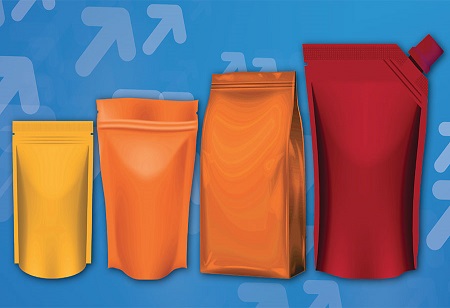The Indian
flexible plastic packaging market size is anticipated to reach USD 12.72 billion by 2025 and the factors driving the market growth include the surge in demand in the end-use industries that comprise pharmaceutical, cosmetic & personal care, and food & beverage, and many other end-user sectors.
The proliferation of growth in sectors such as modern retailing, increase in consumer income, and augmentation in
e-commerce activities, particularly in the developing nations are more likely to buttress the flexible plastic packaging market growth.
Today, people across the world are restoring to panic-buying & bulk stocking owing to the fear of lockdowns and most of them are ordering everyday staples & fresh food through online channels. This has resulted in a surge in demand for flexible plastic packaging. Furthermore, Governments of many affected nations, have asked the food industry players to increase manufacturing to avoid supply-side shocks & shortages to maintain uninterrupted supply.
While the demand for flexible plastic packaging in industries such as pharma is anticipated to stay robust, hospitals, drugs as well as PPE manufacturers are responding to the crises.
Challenges
As per the World Economic Forum, at least eight million tons of plastic leak into the ocean every single year and this is equivalent to throwing contents of 1 garbage truck/minute into the ocean. This is predicted to rise to 2/minute in the next eight years (2030) & 4/minute in the next 28 years (by 2050) and this can lead to the destruction of the ecosystem. About ninety percent of all the waste/trash in the seas and ocean is owing to plastic waste and estimates suggest that a major share is from flexible plastic packaging. Therefore, the recycling process becomes one of the major challenges in this industry.
“Almost close to a trillion-dollar economy is based on the packaging industry as all the multinational
consumer goods or oils, chemicals, fertilizers, cement, etc., is dependent on plastic packaging. So, now it is getting recognition. But even now, the regulations are not completely in line with the requirements of the packaging industry,” says Jeevaraj Pillai, Jt. President Packaging & New Product Development (Flexible Packaging Business), Uflex.
“So, the packaging industry is also fighting on the sustainability front because perception by most people is that packaging is environmentally unfriendly which is not the fact because packaging consumes less power, less shelf space, the transportation cost is less, the product ratio per pack of material is also very high. So, this is actually environment friendly,” he adds.
Requirement of fewer resources & energy
Owing to the busy lifestyles of people in today’s digital era, there is a surge in demand for convenient products. Flexible plastic packaging requires only lesser resources and energy for the packaging process. And, are made available at a lower price and occupies thirty-five percent less retail shelf space, making it cost-effective when compared to other packaging.
One of the members of the Flexible packaging Association says that manufacturing of seven lakh eighty thousand flexible pouches takes eighty-seven percent less coal, seventy-four percent less natural gas, and sixty-four percent less crude oil when compared to the manufacturing of rigid clamshell packages.
“There has been a shift in consumption pattern and the young generation wants everything on the go. So, the challenge for us and the technology which we wanted to get in for consumer goods was that of easy dispensation, ease of functionality, and ease of using the contents of the packaging material,” says Jeevaraj Pillai.
Innovations & developments
Flexible plastic packaging consumes very few natural resources, less energy to manufacture, and emits fewer greenhouse gases. It decreases product waste and rises the shelf-life of the products. For example, fruits such as bananas that are packaged using Flexible plastic packaging ripen at a slower pace when compared to fruits that are not packaged using the same which results in increased product shelf-life. And, such types of packaging can be done using lesser packaging and this helps in reducing product warehousing as well as shipping expenses and helps in improving product protection.
In response to Espoma’s Organic’s mission to “develop the finest organic gardening products that work in harmony with nature, grow beautiful gardens and make a greener world for the future,” last year, Amcor partnered with the brand for innovating more and more sustainable packaging and launched a new bio-based polymer package, where the polyethylene film comprises twenty-five percent bio-based material, which is derived from sugarcane.
Berry Global Group announced its partnership with Mondelez International for supplying packaging containing recycled plastic Philadelphia – the most popular cream cheese in the world, last year in May. The package comprises plastic material recovered utilizing recycling technology.
